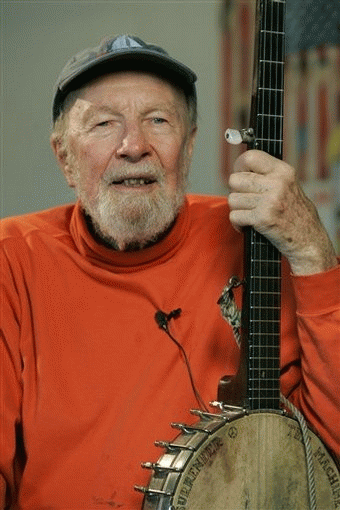At eighty-nine years of age, Pete Seeger doesn't like doing interviews. Seeger's agent, Thom Wolke, explains, "Pete's attitude is that there is nothing more for him to say. He has no more questions to answer, they have already all been asked. Pete says just watch the movie, read the books, or listen to the music!"
However, Seeger's devotion to small farms brought him to Brattleboro, Vermont recently for a series of concerts raising money for a micro-loan program where I caught up with him at a state agricultural center. Pete quipped, "You have to be careful talking about micro-loans around bankers or you will end up with a Blackwater security helicopter over your house."
Pete Seeger, born May 3, 1919 in New York, is the son of Charles Seeger, an academic musicologist. Growing up there were always musical instruments laying around the house. By age 19, Pete was already an accomplished banjo performer when a unique opportunity came along. Folk music archivist Alan Lomax was making a recording tour of the South for the Library of Congress and needed an assistant, introducing Seeger firsthand to rural American life.
A prolific performing artist and author, Pete's work is a living songbook for social change. One book title tells it all about Seeger's creative personal mission, Hard-Hitting Songs for Hard Hit People. Alan Lomax and Woodie Guthrie co-edited the songbook. Guthrie and Seeger met at a benefit concert for migrant workers, an acquaintance that Lomax would later call the beginning of modern folk music.
One of Pete's early music teachers was folk blues singer Elizabeth Cotton, a maid in the elder Seeger's household whom Pete knew well enough to call Libba, who taught him to appreciate songs sung by ordinary people.
In 1940, Pete co-founded his first group, the Almanac Singers. The group toured widely, put out three albums and for a time included Woody Guthrie. During this time, Woody taught Pete about songwriting and the virtues of the simple verse. World War II ended the Almanac Singers and Seeger entered the Army and was shipped out to the Pacific.
After the war Seeger started up The Weavers and by the late 1940's the quartet was one of the most popular bands in the country. Then came the "Red Scare" and the Weavers were blacklisted over Pete's refusal to answer questions before the U.S. House Committee on Un-American Activities. Rather than declaring his 5th Amendment right to not testify, Seeger cited his 1st Amendment right to express his views.
Seeger told the Committee members: "I am not going to answer any questions as to my associations, my philosophical or my religious beliefs, or how I voted in any election or any of these private affairs. I think these are very improper questions for any American to be asked."
Banned from television and radio for seventeen years following his refusal to answer questions about membership in the Communist Party the unrepentant musician now jokes, "I used to think of myself as a radical but I'm probably the most conservative person you ever met. If I had been there when they were inventing the wheel I would have said don't!"
Seeger has conceded a stint as a card-carrying member of the Communist Party decades ago but thinks it is nobody's business as all are entitled to their own opinions. During Pete's days as a Communist he performed with famous vocalist Paul Robeson and was mobbed in Peekskill, New York at a large outdoor concert. The windows were all broken on his car while police watched the hooligans throwing fist-sized rocks at the musicians' cars.
"I never intended to be a musician. I wanted to be a journalist." Seeger explained. However, at young age Pete was paid to sing at an event and he decided it was pretty good money for the amount of work involved. One of his trusty favorite banjos has Pete's motto of good cheer stenciled on the face announcing the banjo will "surround hate and force it to surrender." The famous civil rights song "We Shall Overcome" was first popularized by Seeger who introduced his version of an old hymn to Martin Luther King.
"I fell in love with the old songs that people knew. They had heard their grandmother sing some old song and I realized it was the sense of participation that was so important. So much of modern life you just sit back and you receive. TV is the extreme example of it and you receive a lot of fat. You are being poisoned by thinking that life is just what you see on that screen."
"I think we have a fifty-fifty chance of there being a human race here in a hundred years….But I tell people each one of us has a little grain of sand and if we throw our grains of sand in the right place, who knows. This is also the message of Dr, Seuss, the great writer and illustrator. Lot of little things, millions of little things is what will save this world."
"Just because some terrible things worldwide obviously need to be faced up to, I am more optimistic. The Agricultural Revolution took thousands of years. The Industrial Revolution took hundreds of years. The Information Revolution is only taking decades--who knows, who knows!"
"I tell people don't give up, God only knows what the future is going to be, but if you get in there and do something, you may be surprised. I honestly believe that this world can be saved by the people being active themselves, working with each other. Nobody knows all the answers, but maybe together if we get a handful of people together and talk we will find out something we can do. This needs to be done."
***
This article is an excerpt from the Oct/Nov 2008 issue of Big City Rhythm & Blues magazine. Permission to reprint is granted.




